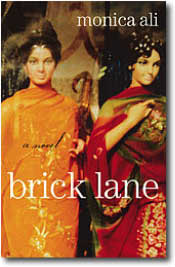
For the last three years I've read and heard about how Monica Ali could be the next big thing, and now that her second work, Alentejo Blue, is finally out in print, I figured it was about time to go ahead and read the much-hyped Brick Lane. Last night, I did just that. It managed to leave me overwhelmingly underwhelmed, and yet I sacrificed much-needed sleep to finish it, so it can't really have been too bad.
A review I once read described her prose as being "unflamboyant," and that turned out to be a euphemism for mundane. Perhaps the hype raised my expectations too far, for this was not The Da Vinci Code, but neither is Ali a wordsmith par excellence.
The fundamental premise of the novel, an exploration of fate and free will, if somewhat unoriginal, is still an interesting one. Anyone who identifies with a diasporic community, and the challenges faced by generations of immigrants, will find plenty to relate to in Brick Lane, in both obvious and more subtle ways. A daughter wearing tight jeans - well we've seen that one before; but the husband framing his cycling proficiency certificate was at least a new spin on an old story.
Most of the formal reviews of Brick Lane have been very generous, almost sycophantically so in some cases. To be fair, there are some aspects of the novel that few would disagree were handled well. For example, the way that Ali pointedly avoids any exploration of the local geography, as if to illustrate the tight confines within which many immigrant families operate such that they are able to imagine that they are back home where they feel they truly belong. Also, the use of religion, in a non-judgemental fashion, as a guiding force for the majority of characters, albeit in differing guises.
Ironically, the construct that truly kept me turning the pages was the one that has been most criticised by both 'expert' reviewers and the general public - the letters from the protagonists sister, Hasina, back in Dhaka. They were intelligently used as a means for chronological advancement of the plot, but for my money their content was integral to both the story, and my enjoyment of it.
They managed to provide a sort of tragi-comic relief, while simultaneously allowing us to connect the two worlds, and further our understanding of the events leading up to and including the (not entirely) climactic moments. The way in which Ali used broken and twisted language really helped build on everything from character to culture and social structure, and those nuances were furthered by Hasina's philosophically astute and sophisticated observations of her world. Those thoughts were shrouded in a veil of simplicity and naivete, but much like the forthright statements of a five year old who does not neccessarily appreciate the inherent complexities of what he is considering, they succinctly and comprehensively depict an entire scenario.
Overall, a decent read, but neither well enough written nor constructed to genuinely move or impact me. Of course, the last book I read that really achieved that was The Kite Runner, so the bar is set pretty high.
No comments:
Post a Comment